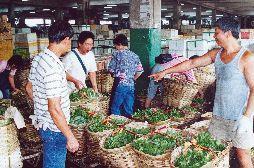
Government health organisations across Asia are on high alert following Chinese media reports that some China-grown vegetables contain excessive levels of melamine, the chemical at the centre of last month’s tainted milk scandal that sickened over 50,000 children in China.
In Taiwan, where some 50,000 tonnes of Chinese vegetables are imported each year, the Council of Agriculture (COA) has set up an emergency panel to tighten imported Chinese vegetable screening, COA officials said. Malaysia’s Health Ministry, meanwhile, has implemented a “Level 4” check on all food products from China before they are released onto the market.
The moves come in response to weekend Chinese press reports that melamine-contamination has been detected in some vegetables, including lettuce, tomatoes, sweet potatoes, edible mushrooms and water celery.
China’s Economics And Finance (Cai Jing) magazine said the commonly-used pesticide cyromazine can produce melamine when it begins to decompose, which could explain why vegetables treated with cyromazine later contained traces of melamine.
It is also common practice to add melamine—a chemical toxin that boosts the nutritional profile of food products—into livestock feed in China, the journal added.
Melamine contamination of baby milk formula was blamed for the deaths of at least four infants and kidney illnesses in over 54,000 children in China last month.
However, the US Food and Drug Administration (FDA) announced on Friday that tiny traces of melamine are not harmful in most foods, except baby formula.
The FDA said its safety experts have concluded that eating a minuscule amount of melamine — 2.5 parts per million — would not raise health concerns, even if a person ate food every day that was tainted with the chemical.
'It would be like if you had a million grains of sand and they were all white, and you had two or three that were black, that's kind of the magnitude,' said Stephen Sundlof, director of the FDA's food safety programme.



